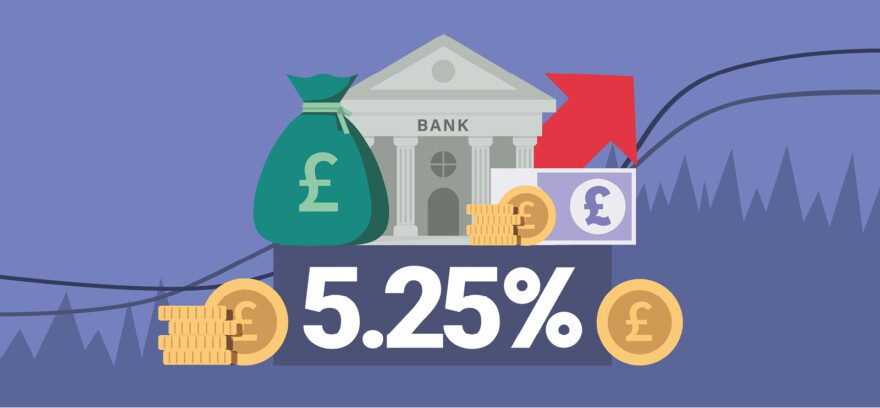UK markets rose this week, with the FTSE 100 Index gaining 1.85% to trade at 7,475 points at the time of writing. The Bank of England’s chief economist has indicated that he will vote to keep interest rates at their current 15-year high of 5.25% for a longer period rather than raising them much further.
Huw Pill announced on Thursday that the UK central bank still had to be vigilant with stubbornly high inflation, but pushed back against financial market expectations that this meant further interest rate rises. The markets are currently pricing in an increase in the Bank of England’s policy rate to 5.75% by the end of the year, before lowering it in 2024 and beyond.
If Pill follows his comments with votes at the Monetary Policy Committee meetings in September and November, this will imply keeping interest rates at 5.25% rather than lifting them further. This contrasts with his prior stance where he voted in favour of higher interest rates at the last 14 meetings of the Bank of England’s Monetary Policy Committee. Pill argued that inflation would fall from July’s annual rate of 6.8% to the Bank of England’s target of 2% if interest rates remained at 5.25% for the next three years. Bank of England insiders said there is not a settled internal view on whether to rapidly raise interest rates or allow them to squeeze demand slowly, now they are in restrictive territory.
Elsewhere, UK house prices contracted at the fastest annual pace since 2009 in August, falling 5.3% last month compared with the same period last year, as the impact of higher interest rates hit the property market according to mortgage provider Nationwide.
The European Union’s statistical office said on Thursday that overall inflation in the Eurozone was unchanged at 5.3% in the year to August, but noted that prices excluding energy and food cooled. The figures came ahead of the European Central Bank’s September 14th meeting, when it will decide whether to risk pushing the Eurozone economy into a recession by raising rates further or allow inflation to become entrenched above its 2% target. The latest figures mean inflation has remained above the European Central Bank’s target for 26 consecutive months and is not below that level in any of the Eurozone’s 20 member countries.
Equity markets
US equity futures rose on Friday, as investors look ahead to the August payrolls report that could guide the economic and interest rate outlook in the US. In Thursday’s regular trading session, The Dow Jones Industrial Average fell 0.48% and the S&P 500 Index lost 0.16%, while the Nasdaq Composite gained 0.11%.
Softer US growth and labour market data released this week added to signs that the world’s largest economy is cooling, boosting investors hopes that the Federal Reserve will not increase interest rates again this year.
A revised reading for US GDP showed the economy expanded at an annualised rate of 2.1% in the second quarter of this year, down from the initial estimate of 2.4%. The figures followed a report that revealed private payrolls rose by 177,000 jobs last month, the smallest gain in five months, however this was less than the 195,000 forecast by economists (polled by Refinitiv).
The Federal Reserve’s preferred inflation gauge, the core PCE Index, increased to an annualised rate of 4.2% in July, up from 4.1% in June, matching analysts expectations. Personal consumption, adjusted for inflation, increased by 0.6% in July, up from 0.4% in June, marking the lowest back-to-back increase in over two years.
Broadly, the PCE report revealed a slightly bigger monthly pickup in inflation than the Consumer Price Index released earlier this month. Both reports showed a decline in the price of goods, such as used cars, as pandemic related supply chain troubles have resolved. However, prices of services such as healthcare, financial advice, transportation, and insurance advanced more dramatically. This is partly because these services are weighted more heavily in the PCE than the CPI Index, and higher wholesale costs play a bigger role.
Commodity markets
In the commodity markets, Brent crude futures traded around $87 per barrel on Friday and are set for a weekly rise, boosted by a large drawdown in US crude inventories and production cuts by OPEC+. US government data released on Wednesday showed the country’s crude inventories fell by a larger-than-expected 10.6 million barrels last week, depleted by high exports and refinery runs.
Meanwhile, analysts expect Saudi Arabia to extend a voluntary oil production cut of 1 million barrels per day into October, adding to cuts put in place by OPEC and allies led by Russia. Chinese factory activity returning to expansion and the government stepping up efforts to support its housing market also helped boost oil prices on Friday, on hope such action could help stimulate demand growth in China, the world’s second-largest oil consumer.
Gold traded around $1,945 an ounce on Friday, rising to a one month high, as the odds of another US interest rate hike were reduced by data earlier in the week, which pointed to a slowing labour market.
The information provided in this communication is not advice or a personal recommendation, and you should not make any investment decisions on the basis of it. If you are unsure of whether an investment is right for you, please seek advice. If you choose to invest, your capital may be at risk and the value of an investment may fall as well as rise in value, so you could get back less than you originally invested.
